【免费下载】小学六年级英语形容词大全
英语形容词
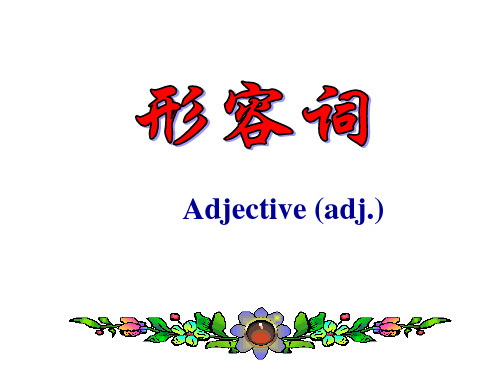
2.形容词可以放在____be__动__词_、__系_动__词__之后, 用来叙述和说明主语的特征或状态。
It feels happy.
She looks beautiful. The apples are red.
2.形容词可以放在__系__动_词______之后,用来 叙述和说明主语的特征或状态。
2.我喝的茶比他多. I drink more tea than he (does).
3.他吃的饭比我少. He has less rice than I (do).
4.一班的学生比二班多. There are more students in Class 1 than in Class 2.
the + 最高级 +(名词)+in/of/among …
3.Kate is more beautiful than Lily is. She is five years older than I am. I drink more tea than he (does).
than前后句子的时态相同。通常用be动词 和助动词do, does 等来简答。
4.I have more pens than you (do). many,much,little,few等词必须带名词。
Li Yong is funny.
Pan Changjiang is funnier than Li Yong.
Ted is the funniest.
Vince is heavy . David is heavier than Vince. Mr Lin is the heaviest of them.
(word完整版)小学英语常见形容词及

小学英语常有形容词及比较级、最高等变化一览表1.在形容词词尾加上“ er、〞“ est构〞成比较级、最高等:bright 〔光明的〕—brighter —brightestbroad〔广阔的〕—broader—broadestcheap〔廉价的〕—cheaper—cheapestclean〔干净的〕—cleaner—cleanestclever〔聪颖的〕—cleverer—cleverestcold〔寒冷的〕—colder—coldestcool〔凉的〕—cooler—coolestdark〔黑暗的〕—darker—darkestdear〔贵的〕—dearer—dearestdeep〔深的〕—deeper—deepestfast〔迅速的〕—faster—fastestfew 〔少的〕—fewer —fewestgreat〔伟大的〕—greater—greatesthard〔困难的,硬的〕—harder—hardesthigh〔高的〕—higher—highestkind〔和蔼的〕—kinder—kindestlight 〔轻的〕—lighter —lightestlong〔长的〕—longer—longestloud〔响亮的〕—louder—loudestnear〔近的〕—nearer—nearestnew〔新的〕—newer—newestpoor〔穷的〕—poorer—poorestquick〔快的〕—quicker—quickestquiet 〔沉寂的〕—quieter—quietestrich 〔丰饶的〕—richer—richestshort 〔短的〕—shorter —shortestslow〔慢的〕—slower—slowestsmall〔小的〕—smaller—smallestsmart〔聪颖的〕—smarter—smartestsoft 〔娇嫩的〕—softer —softeststrong〔强壮的〕—stronger—strongestsweet〔甜的〕—sweeter—sweetesttall 〔高的〕 -taller-tallestthick〔厚的〕—thicker—thickestwarm 〔温暖的〕—warmer—warmestweak〔弱的〕—weaker—weakestyoung〔年轻的〕—younger—youngest2.双写最后一个字母,再加上“ er、〞“ est构〞成比较级、最高等: big〔大的〕—bigger—biggesthot 〔热的〕—hotter —hottestred〔红的〕—redder—reddestsad〔伤心的〕—sadder—saddestthin 〔瘦的〕—thinner —thinnestwet 〔湿的〕—wetter —wettestmad〔疯的〕—madder—maddest3.以不发音的字母 e 结尾的形容词,加上“ r、〞“ st构〞成比较级、最高等:able〔能干的〕—abler—ablestbrave〔勇敢的〕—braver—bravestclose〔凑近的〕—closer—closestfine 〔好的,圆满的〕—finer —finestlarge〔巨大的〕—larger—largestlate 〔迟的〕—later —latestnice〔好的〕—nicer—nicestripe〔成熟的〕—riper—ripestrude〔莽撞的〕—ruder—rudestsafe〔安全的〕—safer—safeststrange〔奇怪的〕—stranger—strangestwide〔宽广的〕—wider —widestwise〔睿智的,聪颖的〕—wiser—wisestwhite 〔白的〕—whiter —whitest4.以字母 y 结尾的形容词,把 y 改为 i,再加上“ er、〞“ est构〞成比较级、最高等:busy〔忙碌的〕—busier—busiestdirty 〔脏的〕—dirtier —dirtiestdry〔无聊的〕—drier—driestearly〔早的〕—earlier—earliesteasy〔简单的〕—easier—easiestfriendly 〔友好的〕—friendlier —friendliestfunny〔好玩的〕—funnier —funniesthappy〔快乐的〕—happier—happiesthealthy〔健康的〕—healthier —healthiestheavy〔重的〕—heavier—heaviesthungry〔饿的〕—hungrier—hungriestlazy〔懒散的〕—lazier—laziestlucky〔好运的〕—luckier—luckiestnaughty〔俏皮的〕—naughtier—naughtiestnoisy〔喧杂的〕—noisier—noisiestpretty 〔美丽的〕—prettier —prettiestsilly〔傻的〕—sillier—silliestspicy〔辣的〕—spicier—spiciestthirsty 〔渴的〕—thirstier —thirstiestugly〔丑的〕—uglier—ugliest5.双音节、多音节形容词,在单词前面加上“ more、〞“ most构〞成比较级、最高等:afraid〔害怕的〕—more afraid—most afraidbeautiful 〔美丽的〕—more beautiful —most beautifulcareful〔仔细的〕—more careful—most carefulcheerful 〔快乐的〕—more cheerful—most cheerfulcrowded〔拥挤的〕—more crowded—most crowdeddangerous〔危险的〕—more dangerous—most dangerousdelicious〔美味的〕—more delicious—most deliciousdifficult 〔困难的〕—more difficult —most difficultexciting〔令人愉悦的〕—more exciting—most excitingexpensive〔昂贵的〕—more expensive—most expensivefamous〔出名的〕—more famous—most famousfrightened 〔惊讶的〕—more frightened —most frightenedfrightening 〔令人害怕的〕—more frightening —most frighteninghard-working 〔勤奋的〕—more hard-working—most hard-workinghelpful 〔有帮助的〕—more helpful —most helpfulhonest〔老实的〕—more honest—most honestimportant 〔重要的〕—more important —most importantinteresting 〔幽默的〕—more interesting —most interestingpolite 〔有礼貌的〕—more polite —most politeterrible 〔可怕的〕—more terrible —most terrible tired 〔累的〕—more tired —most tired6.不规那么变化的形容词:bad〔坏的〕—worse—worstfar〔远的〕—farther —farthest (far —further —furthest) good〔好的〕—better —bestill〔病的〕—worse—worstlittle 〔少的〕—less—leastmany〔多的〕—more —mostmuch〔多的〕—more —mostold〔年老的〕—older —oldest ( old—elder—eldest) well 〔好的,身体好的〕—better —best。
小学六年级英语语法知识形容词
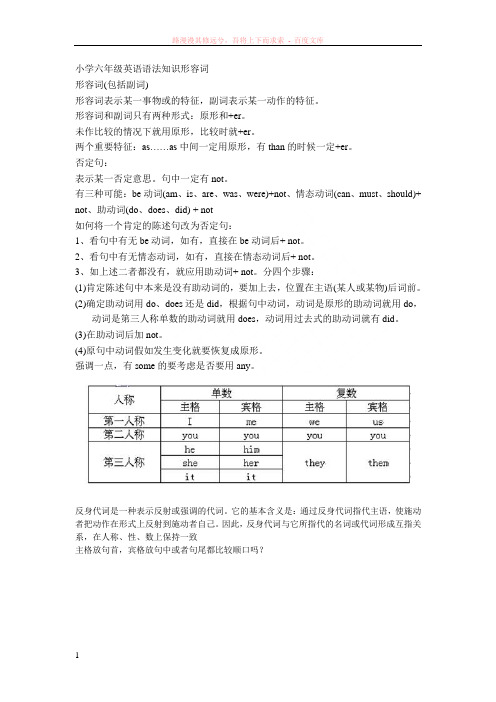
小学六年级英语语法知识形容词形容词(包括副词)形容词表示某一事物或的特征,副词表示某一动作的特征。
形容词和副词只有两种形式:原形和+er。
未作比较的情况下就用原形,比较时就+er。
两个重要特征:as……as中间一定用原形,有than的时候一定+er。
否定句:表示某一否定意思。
句中一定有not。
有三种可能:be动词(am、is、are、was、were)+not、情态动词(can、must、should)+ not、助动词(do、does、did) + not如何将一个肯定的陈述句改为否定句:1、看句中有无be动词,如有,直接在be动词后+ not。
2、看句中有无情态动词,如有,直接在情态动词后+ not。
3、如上述二者都没有,就应用助动词+ not。
分四个步骤:(1)肯定陈述句中本来是没有助动词的,要加上去,位置在主语(某人或某物)后词前。
(2)确定助动词用do、does还是did,根据句中动词,动词是原形的助动词就用do,动词是第三人称单数的助动词就用does,动词用过去式的助动词就有did。
(3)在助动词后加not。
(4)原句中动词假如发生变化就要恢复成原形。
强调一点,有some的要考虑是否要用any。
反身代词是一种表示反射或强调的代词。
它的基本含义是:通过反身代词指代主语,使施动者把动作在形式上反射到施动者自己。
因此,反身代词与它所指代的名词或代词形成互指关系,在人称、性、数上保持一致主格放句首,宾格放句中或者句尾都比较顺口吗?时态是谓语动词所表示的动作或情况发生时间的各种形式.英语动词有16种时态,但是常见的只有九种:一般现在时、一般过去时、一般将来时、现在进行时、过去进行时、现在完成时、过去完成时,过去将来时,现在完成进行时。
常用的时态只有八种。
1.一般现在时的用法1)表示经常性、习惯性的动作;表示现在的状态、特征和真理.句中常用often,usually,every day等时间状语。
形容词英文单词大全
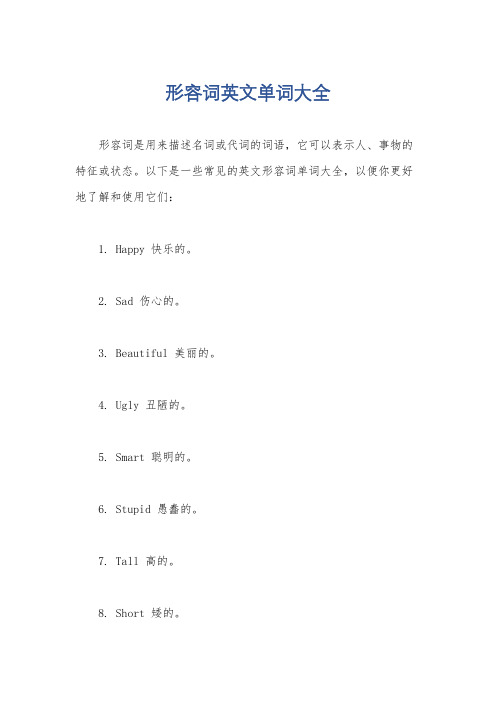
形容词英文单词大全形容词是用来描述名词或代词的词语,它可以表示人、事物的特征或状态。
以下是一些常见的英文形容词单词大全,以便你更好地了解和使用它们:1. Happy 快乐的。
2. Sad 伤心的。
3. Beautiful 美丽的。
4. Ugly 丑陋的。
5. Smart 聪明的。
6. Stupid 愚蠢的。
7. Tall 高的。
8. Short 矮的。
9. Fast 快速的。
10. Slow 缓慢的。
11. Big 大的。
12. Small 小的。
13. Strong 强壮的。
14. Weak 虚弱的。
15. Brave 勇敢的。
16. Cowardly 胆小的。
17. Kind 友善的。
18. Mean 刻薄的。
19. Funny 有趣的。
20. Boring 无聊的。
21. Clever 聪明的。
22. Clumsy 笨拙的。
23. Generous 慷慨的。
24. Stingy 小气的。
25. Honest 诚实的。
26. Dishonest 不诚实的。
27. Polite 有礼貌的。
28. Rude 粗鲁的。
29. Tired 疲倦的。
30. Energetic 精力充沛的。
以上列举了一些常见的英文形容词单词,希望对你有所帮助。
如果你需要更多的形容词单词,可以参考英语词典或在线资源。
形容词在英语中非常重要,它们可以帮助我们更准确地描述事物,丰富语言表达。
希望你能够灵活运用这些形容词,丰富你的词汇量,提高你的英语表达能力。
六年级下册英语单词一单元
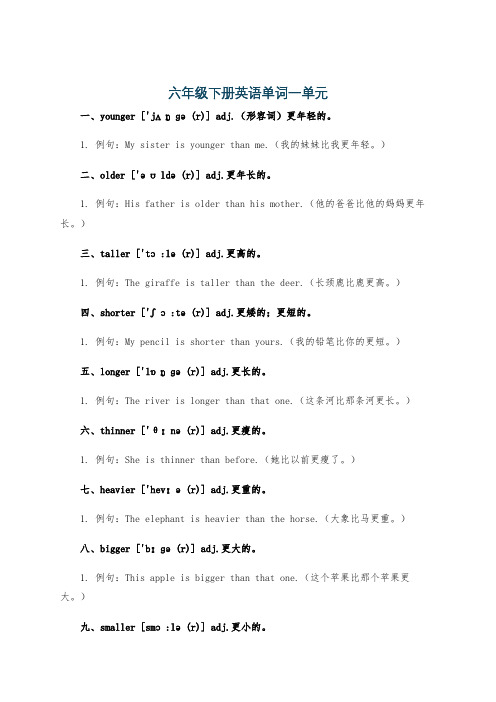
六年级下册英语单词一单元一、younger ['jʌŋɡə(r)] adj.(形容词)更年轻的。
1. 例句:My sister is younger than me.(我的妹妹比我更年轻。
)二、older ['əʊldə(r)] adj.更年长的。
1. 例句:His father is older than his mother.(他的爸爸比他的妈妈更年长。
)三、taller ['tɔ:lə(r)] adj.更高的。
1. 例句:The giraffe is taller than the deer.(长颈鹿比鹿更高。
)四、shorter ['ʃɔ:tə(r)] adj.更矮的;更短的。
1. 例句:My pencil is shorter than yours.(我的铅笔比你的更短。
)五、longer ['lɒŋɡə(r)] adj.更长的。
1. 例句:The river is longer than that one.(这条河比那条河更长。
)六、thinner ['θɪnə(r)] adj.更瘦的。
1. 例句:She is thinner than before.(她比以前更瘦了。
)七、heavier ['hevɪə(r)] adj.更重的。
1. 例句:The elephant is heavier than the horse.(大象比马更重。
)八、bigger ['bɪɡə(r)] adj.更大的。
1. 例句:This apple is bigger than that one.(这个苹果比那个苹果更大。
)九、smaller [smɔ:lə(r)] adj.更小的。
1. 例句:The cat is smaller than the dog.(猫比狗更小。
)十、stronger [strɒŋɡə(r)] adj.更强壮的。
1. 例句:The athlete is stronger than ordinary people.(这个运动员比普通人更强壮。
六年级下册英语重点单词句子

六年级下册英语重点单词句子一、重点单词。
1. younger [ˈjʌŋɡə(r)] 形容词(adj.),比较级形式,意为“更年轻的;更幼小的”。
2. older [ˈəʊldə(r)] 形容词(adj.),比较级形式,意为“更年长的;更旧的”。
3. taller [ˈtɔːlə(r)] 形容词(adj.),比较级形式,意为“更高的”。
4. shorter [ˈʃɔːtə(r)] 形容词(adj.),比较级形式,意为“更短的;更矮的”。
5. longer [ˈlɒŋɡə(r)] 形容词(adj.),比较级形式,意为“更长的”。
6. thinner [ˈθɪnə(r)] 形容词(adj.),比较级形式,意为“更瘦的”。
7. heavier [ˈheviə(r)] 形容词(adj.),比较级形式,意为“更重的”。
8. bigger [ˈbɪɡə(r)] 形容词(adj.),比较级形式,意为“更大的”。
9. smaller [ˈsmɔːlə(r)] 形容词(adj.),比较级形式,意为“更小的”。
10. stronger [ˈstrɒŋɡə(r)] 形容词(adj.),比较级形式,意为“更强壮的”。
11. yesterday [ˈjestədeɪ] 名词(n.),意为“昨天”。
12. last [lɑːst] 形容词(adj.),意为“上一个的;刚过去的”;也可作动词(v.),意为“持续”。
13. before [bɪˈfɔː(r)] 介词(prep.)/副词(adv.),意为“在……之前”。
14. hotel [həʊˈtel] 名词(n.),意为“旅馆”。
15. fixed [fɪkst] 动词(v.),fix的过去式,意为“修理;固定”。
16. broken [ˈbrəʊkən] 形容词(adj.),意为“破损的;弄坏了的”。
17. lamp [læmp] 名词(n.),意为“台灯”。
三到六年级上册形容词
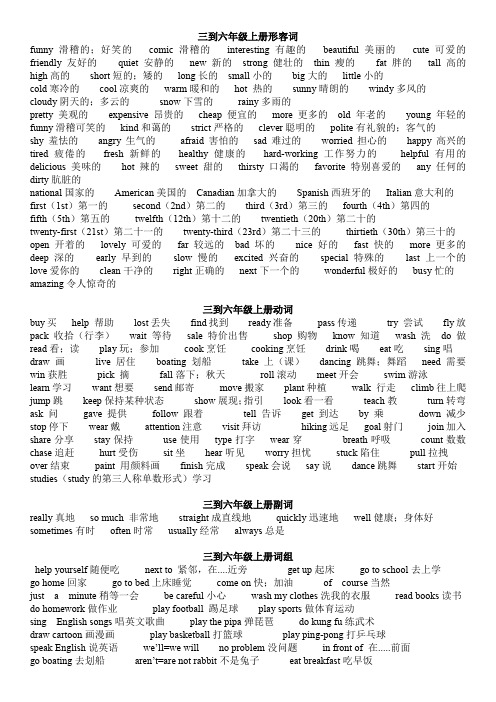
三到六年级上册形容词funny滑稽的;好笑的comic滑稽的interesting有趣的beautiful美丽的cute可爱的friendly友好的quiet安静的new新的strong健壮的thin瘦的fat胖的tall高的high高的short短的;矮的long长的small小的big大的little小的cold寒冷的cool凉爽的warm暖和的hot 热的sunny晴朗的windy多风的cloudy阴天的;多云的snow下雪的rainy多雨的pretty美观的expensive昂贵的cheap便宜的more更多的old年老的young年轻的funny滑稽可笑的kind和蔼的strict严格的clever聪明的polite有礼貌的;客气的shy羞怯的angry生气的afraid害怕的sad难过的worried担心的happy高兴的tired疲倦的fresh新鲜的healthy健康的hard-working工作努力的helpful有用的delicious美味的hot辣的sweet甜的thirsty口渴的favorite特别喜爱的any任何的dirty肮脏的national国家的American美国的Canadian加拿大的Spanish西班牙的Italian意大利的first(1st)第一的second(2nd)第二的third(3rd)第三的fourth(4th)第四的fifth(5th)第五的twelfth(12th)第十二的twentieth(20th)第二十的twenty-first(21st)第二十一的twenty-third(23rd)第二十三的thirtieth(30th)第三十的open开着的lovely可爱的far较远的bad坏的nice好的fast快的more更多的deep深的early早到的slow慢的excited兴奋的special 特殊的last上一个的love爱你的clean干净的right正确的next下一个的wonderful极好的busy忙的amazing令人惊奇的三到六年级上册动词buy买help 帮助lost丢失find找到ready准备pass传递try 尝试fly放pack收拾(行李)wait等待sale特价出售shop购物know知道wash洗do做read看;读play玩;参加cook烹饪cooking烹饪drink喝eat吃sing唱draw画live居住boating划船take上(课)dancing跳舞;舞蹈need需要win获胜pick 摘fall落下;秋天roll滚动meet开会swim游泳learn学习want想要send邮寄move搬家plant种植walk 行走climb往上爬jump跳keep保持某种状态show展现;指引look看一看teach教turn转弯ask问gave提供follow跟着tell告诉get到达by乘down减少stop停下wear戴attention注意visit拜访hiking远足goal射门join加入share分享stay保持use使用type打字wear穿breath呼吸count数数chase追赶hurt受伤sit坐hear听见worry担忧stuck陷住pull拉拽over结束paint 用颜料画finish完成speak会说say说dance跳舞start开始studies(study的第三人称单数形式)学习三到六年级上册副词really真地so much 非常地straight成直线地quickly迅速地well健康;身体好sometimes有时often时常usually经常always总是三到六年级上册词组help yourself随便吃next to 紧邻,在....近旁get up起床go to school去上学go home回家go to bed上床睡觉come on快;加油of course当然just a minute稍等一会be careful小心wash my clothes洗我的衣服read books读书do homework做作业play football 踢足球play sports做体育运动sing English songs唱英文歌曲play the pipa弹琵琶do kung fu练武术draw cartoon画漫画play basketball打篮球play ping-pong打乒乓球speak English说英语we’ll=we will no problem没问题in front of 在.....前面go boating去划船aren’t=are not rabbit不是兔子eat breakfast吃早饭have ... class上...课play sports进行体育运动do morning exercises做早操eat dinner吃晚饭clean my room打扫我的房间go for a walk去散步go shopping去购物take a dancing class上舞蹈课go swimming去游泳go on a picnic去野餐pick apples摘苹果make a snowman 堆雪人go swimming去游泳good job做得好 a few 一些look for寻找drink water喝水doing morning exercises(正在)做早操eating lunch(正在)吃午饭having....class(正在)上....课reading a book(正在)看书listening to music(正在)听音乐keep to the right 靠右keep your desk clean 保持你的课桌干净talk quietly 小声讲话take turns按顺序来on foot步行slow down慢下来pay attention to注意see a film看电影take a trip去旅行get together聚会see a doctor看病lots of大量take a deep breath深深吸一口气count to ten数到十try on试穿each other相互其它(所有格)your 你(们)的his他的her她的yours你的;你们的whose谁的mine我的our我们的yours你(们)的his他的hers她的theirs他(她、它)们的ours我们的their他们的(人称)I我me我she她he 他him他us我们they他们them他、她、它们this这个that那个these这些those那些(方位)on在.....上in在......里under在....下面near在……的旁边front正面between在....中间above在...上面beside在旁边behind在...后面left左边right右边(疑问词)what什么who谁whose谁的which哪个when何时where何地why为什么how怎么样how about .....怎么样?how much多少钱(不分类)no不OK 好and和,并且so 这么,那么or 或者but但是o’clock ....点钟outside在户外too太;过于just正好will将要should应该every每个there这儿lot大量everywhere处处after在...之后 a.m.上午p.m.下午best最because 因为all完全few 很少still 仍然each每一other其他like像.....那样anything任何事物else其他sure当然must必须half一半together一起if如果should应该feel觉得everyone每人。
小学六年级英语知识点复习之形容词性物主代词
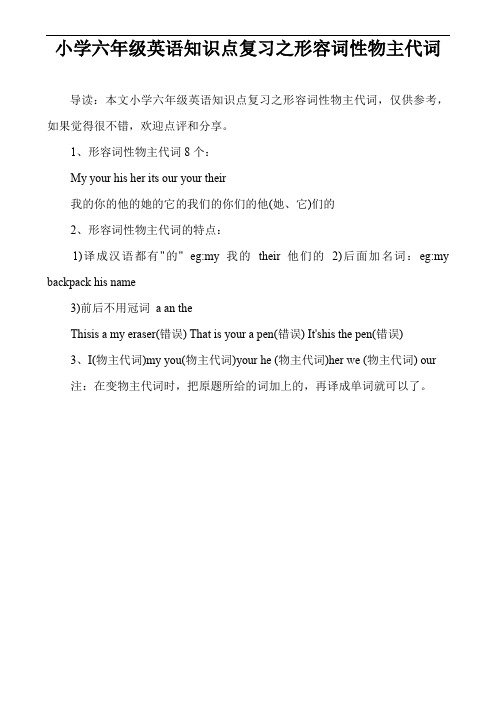
小学六年级英语知识点复习之形容词性物主代词
导读:本文小学六年级英语知识点复习之形容词性物主代词,仅供参考,如果觉得很不错,欢迎点评和分享。
1、形容词性物主代词8个:
My your his her its our your their
我的你的他的她的它的我们的你们的他(她、它)们的
2、形容词性物主代词的特点:
1)译成汉语都有"的" eg:my 我的their 他们的2)后面加名词:eg:my backpack his name
3)前后不用冠词a an the
Thisis a my eraser(错误) That is your a pen(错误) It'shis the pen(错误)
3、I(物主代词)my you(物主代词)your he (物主代词)her we (物主代词) our
注:在变物主代词时,把原题所给的词加上的,再译成单词就可以了。
【免费下载】小学六年级英语形容词大全
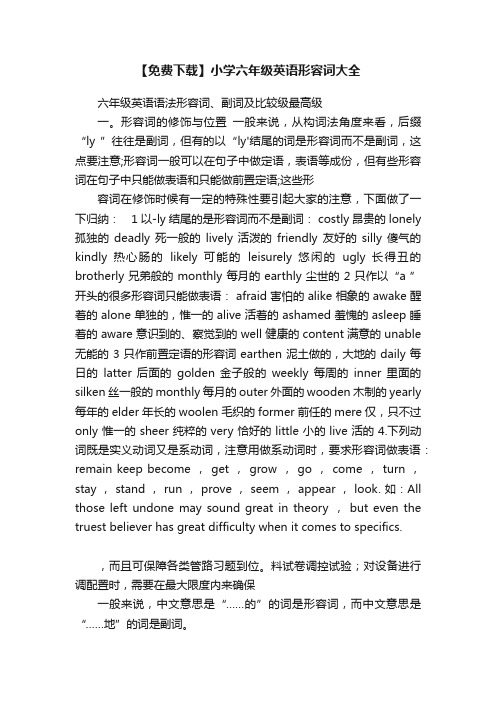
【免费下载】小学六年级英语形容词大全六年级英语语法形容词、副词及比较级最高级一。
形容词的修饰与位置一般来说,从构词法角度来看,后缀“ly ”往往是副词,但有的以“ly'结尾的词是形容词而不是副词,这点要注意;形容词一般可以在句子中做定语,表语等成份,但有些形容词在句子中只能做表语和只能做前置定语;这些形容词在修饰时候有一定的特殊性要引起大家的注意,下面做了一下归纳: 1 以-ly 结尾的是形容词而不是副词: costly 昂贵的 lonely 孤独的deadly 死一般的lively 活泼的friendly 友好的silly 傻气的kindly 热心肠的likely 可能的leisurely 悠闲的ugly 长得丑的brotherly 兄弟般的 monthly 每月的 earthly 尘世的 2 只作以“a ”开头的很多形容词只能做表语: afraid 害怕的 alike 相象的 awake 醒着的 alone 单独的,惟一的 alive 活着的 ashamed 羞愧的 asleep 睡着的 aware 意识到的、察觉到的 well 健康的 content 满意的 unable 无能的 3 只作前置定语的形容词 earthen 泥土做的,大地的 daily 每日的latter 后面的golden 金子般的weekly 每周的inner 里面的silken 丝一般的 monthly 每月的 outer 外面的 wooden 木制的 yearly 每年的 elder 年长的 woolen 毛织的 former 前任的 mere 仅,只不过only 惟一的 sheer 纯粹的 very 恰好的 little 小的 live 活的 4.下列动词既是实义动词又是系动词,注意用做系动词时,要求形容词做表语:remain keep become , get , grow , go , come , turn ,stay , stand , run , prove , seem , appear , look. 如:All those left undone may sound great in theory ,but even the truest believer has great difficulty when it comes to specifics.,而且可保障各类管路习题到位。
外研版三年级起点六年级总复习所有形容词

• 暖和的 • 热的 • 凉爽的 • 寒冷的 • 晴朗的 • 有风的 • 多云的 • 下雨 • 下雪
•beautiful •famous •close •young •old •short •long
•美丽的 •出名的 •接近(也有关的意思V) •年轻的 •老的 •短的 •长的
•clean •dirty •busy •delicious •really •ready
•excited •激动的
•better
•更好的
•foreign •外国的
•frightened •害怕的
•next
•下一个
•last
•上一个
• 不同的 •困难的 •容易的 •中间的 •初等的 •早的 •迟的
•Chinese •Japanese •American •strong •broken •hard
•中国的 •日本的 •美国人的 •强壮的 •坏的 •困难的
•heavy
• 重的
•light
•轻的
•dangerous •危险的
•careful
•干净的 •脏的 •忙的 •美味的 •真的 •准备好的
•thirsty •hungry •little •more •same •different
•渴的 •饿的 •极少的 •更多的 •一样的 •不同的
•different •difficult •easy •middle •primary •early •late
• fine • strong • clever • smart • cute • little • old • big
•健康的 强壮的
•聪明的 •聪明的 •可爱的 •小的 •老的 •大的
•nice •kind •tall •short •thin •fat
30个常见的形容词英语
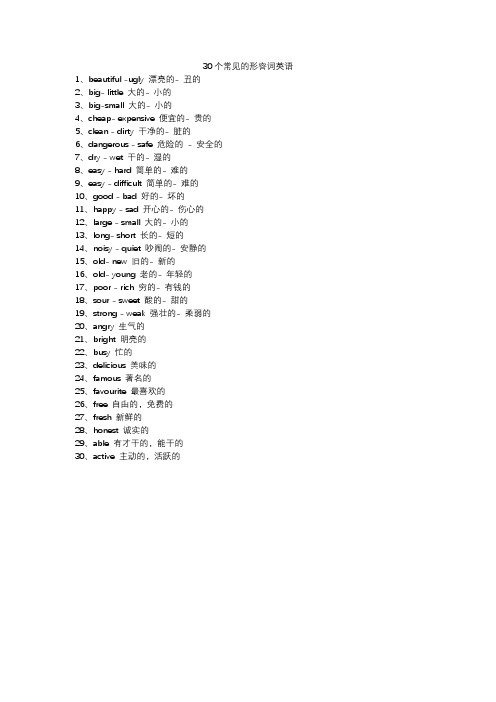
30个常见的形容词英语
1、beautiful -ugly 漂亮的- 丑的
2、big- little 大的- 小的
3、big-small 大的- 小的
4、cheap- expensive 便宜的- 贵的
5、clean - dirty 干净的- 脏的
6、dangerous - safe 危险的- 安全的
7、dry - wet 干的- 湿的
8、easy - hard 简单的- 难的
9、easy - difficult 简单的- 难的
10、good - bad 好的- 坏的
11、happy - sad 开心的- 伤心的
12、large - small 大的- 小的
13、long- short 长的- 短的
14、noisy - quiet 吵闹的- 安静的
15、old- new 旧的- 新的
16、old- young 老的- 年轻的
17、poor - rich 穷的- 有钱的
18、sour - sweet 酸的- 甜的
19、strong - weak 强壮的- 柔弱的
20、angry 生气的
21、bright 明亮的
22、busy 忙的
23、delicious 美味的
24、famous 著名的
25、favourite 最喜欢的
26、free 自由的,免费的
27、fresh 新鲜的
28、honest 诚实的
29、able 有才干的,能干的
30、active 主动的,活跃的。
小学英语单词之形容词
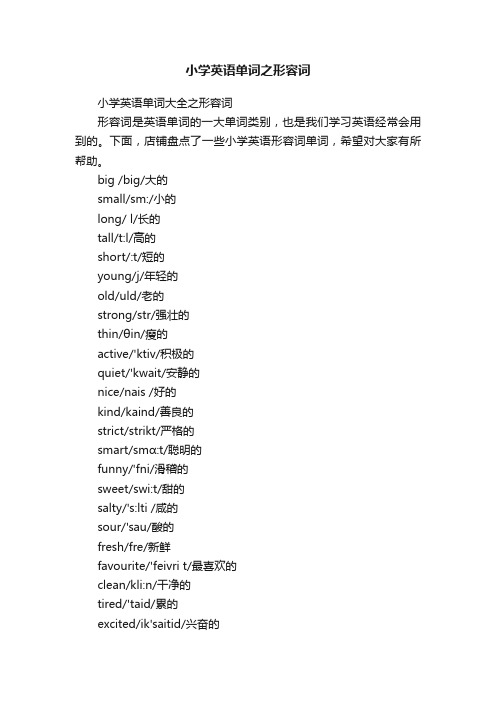
小学英语单词之形容词小学英语单词大全之形容词形容词是英语单词的一大单词类别,也是我们学习英语经常会用到的。
下面,店铺盘点了一些小学英语形容词单词,希望对大家有所帮助。
big /big/大的small/sm:/小的long/ l/长的tall/t:l/高的short/:t/短的young/j/年轻的old/uld/老的strong/str/强壮的thin/θin/瘦的active/'ktiv/积极的quiet/'kwait/安静的nice/nais /好的kind/kaind/善良的strict/strikt/严格的smart/smɑ:t/聪明的funny/'fni/滑稽的sweet/swi:t/甜的salty/'s:lti /咸的sour/'sau/酸的fresh/fre/新鲜favourite/'feivri t/最喜欢的clean/kli:n/干净的tired/'taid/累的excited/ik'saitid/兴奋的angry/'gri/生气的happy/'hpi/高兴的bored/b:d/无聊的sad/sd/难过的taller更高的shorter更短的stronger更强壮的older更老的younger更年轻的bigger更大的heavier更重的longer 更长的thinner更瘦的smaller更小的 good好的better更好的higher更高的fine/fain/好的great/greit/棒的heavy/'hevi/重的new/nju:/新的fat/ft/胖的right /rait/对的hungry/'hgri/饿的cute/kju:t/可爱的little/'litl/小的lovely/'lvli/可爱的beautiful/'bju:tfl/漂亮的colourful/'klful/五颜六色的pretty/'priti/漂亮的cheap/ti:p/便宜的expensive/iks'pensiv/贵的juicy/'du:si/有汁的healthy/'helθi/健康的helpful/'helpfl /有帮助的high/hai/高的easy/'i:zi/简单的proud/praud/骄傲的PEP小学英语单词总汇PEP英语三年级(上册)三会单词Unit 1pen 钢笔 pencil 铅笔 pencil-case 铅笔盒 ruler 尺子 eraser 橡皮crayon 蜡笔book 书 bag 书包 sharpener 卷笔刀 school 学校Unit 2head 头face 脸nose 鼻子mouth 嘴eye 眼睛ear 耳朵arm 胳膊finger 手指 leg腿foot 脚body 身体Unit3red 红色的yellow 黄色的green 绿色的blue 蓝色的 purple 紫色的white 白色的black 黑色的orange 橙色的pink 粉色的brown 棕色的Unit 4cat 猫dog 狗monkey 猴子panda 熊猫rabbit 兔子duck 鸭子pig 猪bird 鸟bear 熊elephant 大象mouse 老鼠squirrel 松鼠Unit 5cake 蛋糕bread 面包hot dog 热狗hamburger 汉堡包chicken 鸡肉French fries 榨薯条Coke 可乐juice 果汁milk 牛奶water 水tea 茶coffee 咖啡Unit 6one 一two 二three 三four 四five 五six 六seven 七eight 八nine 九ten 十doll 玩具娃娃boat 小船ball 球kite 风筝balloon 气球car 小汽车plane 飞机PEP英语三年级(下册)三会单词Unit 1boy 男孩 girl 女孩teacher 教师student 学生this 这个my 我的friend 朋友I’m=I am 我是nice 好的;愉快的good morning 早上好good afternoon 下午好meet 遇见;碰见goodbye 再见too 也;太Unit 2father 父亲;爸爸dad 爸爸(口语)mother 母亲;妈妈mom 妈妈(口语)man男人woman 女人grandmother (外)祖母grandma (口语)(外)祖母grandfather (外)祖父grandpa (口语)(外)祖父sister 姐妹brother 兄弟let’s=let us让我们great 太好了really 真地;确切地and 和;并且how 多么;怎么样Unit 3eleven 十一twelve 十二thirteen 十三fourteen 十四fifteen 十五sixteen 十六seventeen 十七eighteen 十八nineteen 十九twenty 二十how many 多少can 能够;可以look at 看;瞧Unit 4peach 桃pear 梨orange 橙子watermelon 西瓜apple 苹果banana 香蕉strawberry 草莓grape 葡萄like 喜欢some 一些;某些thanks 多谢Unit 5bus 公共汽车bike 自行车taxi 出租车jeep 吉普车desk 课桌chair 椅子walkman 随身听lamp 台灯your 你的;你们的zoo 动物园Unit 6small 小的big 大的long 长的short 短的;矮的tall 高的giraffe 长颈鹿deer 鹿PEP四年级上册四会单词词汇表Unit 1Window(窗户) board(板) light(灯) picture(图片) door(门) floor(地板) classroom (教室) computer(电脑) teacher’desk(讲台) wall(墙) fan(扇子)Unit 2bag(包) pencil(铅笔) pen(钢笔) book (书) ruler(尺子) pencil-case(铅笔盒)Unit 3teacher(教师) student(学生) boy(男孩) girl(女孩) friend(朋友) Unit 4home(家) room(房间) school(学校) classroom(教室)window(窗户) desk(课桌;书桌) door(门) chair(椅子) bed(床) Unit 5rice(米饭) beef(牛肉) bread(面包) milk(牛奶) egg(蛋)watter(水) chicken(鸡肉) fish(鱼)Unit 6sister(姐妹) brother(兄弟) father(父亲;爸爸) mother(母亲;妈妈)driver(司机) doctor(医生) farmer(农民) nurse(护士)PEP四年级下册四会单词词汇表Unit 1computer(计算机) board(写字板) fan(风扇) light(灯)this(这;这个) is(是)my(我的) that(那;那个) your(你的)teacher’s desk(讲台) picture(图画;照片) wall(墙壁) floor(地板) yes(是;是的) it(它)Unit 2one(一) two(二) three(三) four(四) five(五) six(六) seven(七) eight(八) nine(九) ten(十) what(什么) time(时间)it’s=it is …o’clock(…点钟) math(数学) Chinese(语文) English(英语) P.E.(体育) music(音乐) for(为;给) class(课程)关于动物的小学英语单词大全动物(animals)猫cat狗dog猪pig鸭duck兔rabbit马horse大象elephant蚂蚁ant鱼fish鹰eagle鹿deer海狸beaver鸟bird蛇snake老鼠mouse松鼠squirrel熊bear袋鼠kangaroo猴monkey熊猫panda狮子lion老虎tiger狐狸fox斑马zebra长颈鹿giraffe鹅goose母鸡hen火鸡turkey小羊lamb绵羊sheep山羊goat奶牛cow驴donkey鱿鱼squid龙虾lobster鲨鱼shark海豹seal抹香鲸sperm whale虎鲸killer whale小学英语单词记忆方法有哪些1、观察记忆法利用这种方法在初次接触单词时可以通过巧妙观察很快记住单词。
小学英语单词大全-形容词

小学英语单词大全:形容词篇一:小学英语单词大全(带音标)小学英语单词分类表学习用品(school things)pen /pen/ 钢笔pencil /'pensl/ 铅笔pencil-case /'penslkeis / 铅笔盒ruler /'ru:l?/ 尺子book /buk/ 书bag /b?g/ 包post card /p?ust kɑ:d/ 明信片newspaper /'nju:z,peip?/ 报纸schoolbag /sku:lb?g/ 书包eraser / i'reis? / 橡皮crayon / 'krei?n / 蜡笔sharpener / '?ɑ:p?n? / 卷笔刀story-book / 'st?:ri] buk / 故事书notebook / 'n?utbuk / 笔记本Chinese book/ 't?ai'ni:z / 语文书English book / 'i?gli? / 英语书maths book/ m?θs / 数学书magazine / ,m?g?'zi:n / 杂志newspaper / 'nju:z,peip? / 报纸dictionary / 'dik??neri / 词典二、身体部位(body)foot / fut / 脚head / hed / 头face / feis / 脸hair / h?? / 头发nose / n?uz / 鼻子mouth / mauθ / 嘴eye / ai / 眼睛ear / i? / 耳朵arm / ɑ:m / 手臂hand / h?nd / 手finger / 'fi?g? / 手指leg / leg / 腿tail / teil / 尾巴三、颜色(colours)red /red/ 红blue /blu:/ 蓝yellow /'jel?u/ 黄green /gri:n/ 绿white /wait/ 白black /bl?k/ 黑pink /pi?k/ 粉红purple /'p?:pl/ 紫orange /'?:rind?/ 橙brown /braun/ 棕四、动物(animals)cat /k?t/ 猫dog /d?g/ 狗pig /pig/ 猪duck /d?k/ 鸭rabbit /'r?bit/ 兔子horse /h?:s/ 马elephant /'elif?nt/ 大象ant /?nt/ 蚂蚁fish /fi?/ 鱼bird /b?:d/ 鸟snake /sneik/ 蛇mouse /maus/ 鼠kangaroo /,k??g?'ru:/ 袋鼠monkey /'m??ki/ 猴子panda /'p?nd?/ 熊猫bear /b??/ 熊lion /'lai?n/ 狮tiger /'taig?/ 老虎fox/f?ks/ 狐狸zebra /'zi:br?/ 斑马deer /di?/ 鹿giraffe /d?i'rɑ:f/ 长颈鹿goose /gu:s/ 鹅hen /hen/ 母鸡turkey /'t?:ki/ 火鸡lamb /l?m/ 小羊sheep /?i:p/ 绵羊goat /g?ut/ 山羊cow /kau/ 奶牛shark /'?ɑ:k/ 鲨鱼seal / si:l / 海豹五、人物(people)friend /frend/ 朋友boy / b?i / 男孩girl /g?:l/ 女孩mother /'m?e?/ 母亲father /'fɑ:e?/ 父亲sister /'sist?/ 姐妹brother /'br?e?/ 兄弟uncle /'??kl/ 叔叔man /m?n/ 男人woman/ 'wum?n/女人Mr先生Miss小姐lady /'leidi/ 女士mom /m?m/ 妈妈dad /d?d/ 爸爸parents /'p??r?nts/ 父母grandma /'gr?ndmɑ:/grandmother /'gr?nd,m?e?/(外)祖母grandpa/'gr?ndpɑ:/ grandfather /'gr?nd,fɑ:e?/(外)祖父aunt /ɑ:nt/ 阿姨cousin /'k?zn/ 堂兄妹son /s?n/ 儿子baby /'beibi/ 婴儿kid /kid/小孩classmate/'klɑ:smeit /同学queen /'kwi:n/ 女visitor /'vizit?/ 参观者neighbour /'neib? / 邻居principal /'prins?p?l / 校长pen pal / pen p?l / 笔友tourist /'tu:rist / 旅行者people /'pi:pl / 人物robot /'r?ub?t / 机器人六、职业(job)teacher /'ti:t??/ 教师student /'stju:d?nt/学生doctor /'d?kt?/ 医生nurse /n?:s/ 护士driver /'draiv? / 司机farmer /'fɑ:m?/ 农民singer /'si??/ 歌唱家writer /'rait?/ 作家artist /'ɑ:tist /画家actor /'?kt?/男演员actress/'?ktris/女演员TV reporter /ri'p?:t?/ 电视台记者engineer /,end?i'ni? / 工程师policeman / p?'li:sm?n /(男)警察salesperson /'seilz,p?:sn / 销售员cleaner /'kli:n? / 清洁工baseball player/'beis,b?:l 'plei?/棒球运动员assistant / ?'sist?nt / 售货员食品(food and drink:)breakfast /'brekf?st / 早餐lunch /l?nt?/ 中餐dinner /'din?/ 晚餐egg /eg/ 鸡蛋rice /rais/ 米饭cake /keik/ 蛋糕bread/bred/ 面包jam /d??m/ 果酱biscuit /'biskit/ 饼干sausage /'s?:sid?/ 香肠sandwich /'s?ndwit?/ 三明治dumplings /'d?mpli?/ 饺子French fries/frent? fraiz/ 薯条meat /mi:t/ 肉chicken /'t?ikin/ 鸡肉mutton /'m?tn/ 羊肉beef /bi:f/ 牛肉pork /p?:k/ 猪肉fish /fi?/ 鱼hamburger /'h?mb?:g?/ 汉堡hot dog /h?t d?g/ 热狗noodles /'nu:dl/ 面条soup /su:p/ 汤salad /'s?l?d/ 沙拉milk /milk/牛奶water /'w?:t?/ 水ice-cream /ais kri:m/ 冰淇淋cola /'k?ul?/ 可乐juice /d?u:s/ 果汁tea /ti:/ 茶coffee /'k?fi/ 咖啡fruit/fru:t/ 水果apple /'?pl / 苹果banana / b?'nɑ:n? / 香蕉pear /p?? / 梨orange /'?:rind? / 橙watermelon /'w?:t?,mel?n / 西瓜grape / greip / 葡萄cherry/'t?eri / 樱桃lemon/ 'lem?n / 柠檬mango/ 'm??g?u /芒果coconut/'k?uk?n?t /椰子peach /pi:t?/ 桃strawberry / 'str?:b?ri / 草莓vegetable/ 'ved?it?bl / 蔬菜eggplant / 'egplɑ:nt / 茄子green beans / gri:n bi:ns / 青豆tomato / t?'meit?u / 西红柿potato / p?'teit?u / 土豆cucumber / 'kju:k?mb? / 黄瓜onion / '?nj?n / 洋葱pea / pi:/ 豌豆carrot / 'k?r?t / 胡萝卜cabbage /'k?bid? / 卷心菜pumpkin / 'p?mpkin / 南瓜sweet potato/ swi:t p?'teit?u / 红薯八、衣服(clothes)jacket /'d??kit/ 夹克衫shirt /??:t/ 衬衫T-shirt T恤衫skirt /sk?:t/ 短裙子dress /dres/ 连衣裙jeans /d?i:nz/ 牛仔裤pants /p?nts/ /trousers /'trauz?z / 裤子socks /s?ks/ 袜子shoes /?u:z/ 鞋子sweater /'swet?/ 毛衣coat /k?ut/ 外套raincoat /'reink?ut/ 雨衣shorts /??:ts/ 短裤sandals /'s?ndl/凉鞋boots /bu:ts/ 靴子hat /h?t/ 有边帽cap /k?p/ 无边帽tie /tai/ 领带sunglasses /'s?nglɑ:siz/太阳镜scarf /skɑ:f/ 围巾gloves /gl?vz/手套九、交通工具(vehicles)bike /baik/ 自行车bus /b?s/ 公共汽车train /trein/ 火车boat /b?ut/ 小船ship /?ip/ 轮船yacht /j?t/ 快艇car /kɑ:/ 小汽车taxi /'t?ksi/出租车jeep /d?i:p/ 吉普车van /v?n/ 小货车plane /plein/飞机subway /'s?bwei/地铁motor cycle /'m?ut? 'saikl / 摩托车十、杂物(other things)window /'wind?u/ 窗户door /d?:/ 门desk /desk/ 课桌chair /t???/ 椅子bed /bed/ 床computer/k?m'pju:t?/计算机board /b?:d/ 写字板fan /f?n/ 风扇light /lait/ 灯mirror /'mir?/ 镜子teacher’s desk / 'ti:t?? desk/ 讲台picture /'pikt??/ 图画photo /'f?ut?u/ 照片wall /w?:l/ 墙壁floor /fl?:/ 地板football /'futb?:l/ 足球present / 'preznt / /gift / gift / 礼物walkman / 'w?:km?n / 随身听lamp /l?mp/ 台灯phone /f?un/ 电话sofa /'s?uf?/ 沙发shelf /?elf/ 书架fridge /frid?/ 冰箱table /'teibl/ 桌子air-conditioner /?? k?n'di??n?/ 空调key /ki:/ 钥匙lock /l?k/ 锁plate /pleit/ 盘子knife /naif/ 刀fork /f?:k/ 叉spoon /spu:n/ 勺子chopsticks /'t??pstiks/ 筷子pot /p?t/ 锅toy /t?i/ 玩具doll /d?l/ 洋娃娃ball /b?:l/ 球balloon /b?'lu:n/ 气球kite /kait/ 风筝jigsaw puzzle /'d?igs?: 'p?zl/ 拼图游戏box /b?ks/ 盒子umbrella /?m'brel?/ 伞zipper /'zip?/ 拉链violin /,vai?'lin/小提琴nest /nest/ 鸟窝hole /h?ul/ 洞toothbrush /'tu:θbr??/ 牙刷menu /'menju:/菜单e-card /kɑ:d/电子卡片e-mail /meil/电子邮件money /'m?ni/ 钱traffic light /'tr?fik lait/ 交通灯medicine /'medisin/ 药十一、地点(locations)home /h?um/ 家room /ru:m/ 房间bedroom /'bedrum/ 卧室bathroom /'b?θrum/卫生间living room / 'livi? ru:m / 起居室/客厅kitchen /'kit?in/ 厨房classroom /'klɑ:srum/ 教室school /sku:l/ 学校park /pɑ:k/ 公园library /'laibr?ri/ 图书馆post office/p?ust '?:fis/ 邮政局hospital /'h?spitl/医院cinema /'sinim?/ 电影院bookstore /'bukst?:/ 书店farm /fɑ:m/ 农场zoo /zu:/ 动物园garden /'gɑ:dn/ 花园playground /'pleigraund/ 操场canteen /k?n'ti:n/ 餐厅teacher’s office /'?:fis/ 教师办公室gym /d?im/ 体育馆washroom /'w??rum/ 盥洗室art room /ɑ:t ru:m/ 美术室computer room /k?m'pju:t?/ 电脑房music room /'mju:zik/ 音乐教室TV room电视房flat /fl?t/ 公寓company /'k?mp?ni/ 公司factory /'f?kt?ri/ 工厂pet shop /pet ??p/ 宠物店science museum/'sai?ns mju:'zi?m/科学博物馆the Great Wall /greit w?:l/ 长城supermarket /'sju:p?,mɑ:kit/ 超市bank /b??k/ 银行country /'k?ntri/乡村village /'vilid?/ 村庄city /'siti/ 城市十二、气象(weather)cold /k?uld/ 冷的hot /h?t/ 热的warm /w?:m/ 温暖的cool /ku:l/ 凉爽的snowy /sn?ui/下雪的sunny /'s?ni/晴朗的rainy /'reini/ 下雨windy /'windi/ 刮风的cloudy /'klaudi/ 多云的weather report/'wee? ri'p?:t/ 天气预报十三、景物(nature)river /'riv?/ 河流lake /leik/ 湖泊stream /stri:m/ 小溪forest /'f?rist/ 森林path /pɑ:θ/ 小路road /r?ud/马路house /r?ud/ 房子bridge / brid? / 桥building /'bildi?/建筑物rain /rein/ 雨cloud /klaud/ 云sun /s?n/ 太阳mountain /'mauntin /大山sky /skai/ 天空rainbow /'reinb?u/ 彩虹wind /waind/风air /??/ 空气十四、植物(plants)flower /'flau?/ 花grass /grɑ:s/ 草tree /tri:/树seed /si:d/种子leaf /li:f/树叶plant /plɑ:nt/ 植物rose /r?uz/ 玫瑰十五、星期(week)Monday/'m?ndei/Tuesday/'tju:zdi/Wednesday/wenzdi/ Thursday/'θ?:zdi/Friday /'fraidi/ Saturday/'s?t?di/ Sunday /'s?ndi/ weekend/'wi:k'end/周末十六、月份(months)January/'d??njueri/ February/'febru?ri/March /mɑ:t?/ April /'eipr?l/May /mei/ June /d?u:n/July /d?u:'lai/August /?:'g?st/September /sep'temb?/October/?k't?ub?/ November/n?u'vemb?/ December /di'semb?/ 十七、季节(seasons)spring /spri?/summer /'s?m?/fall/autumn/f?:l '?:t?m/ winter/'wint?/ 十八、方位(directions)south/sauθ/南north/n?:θ/北east/i:st/东west/west/西left/left/ 左right/rait/右十九、患病(illness)have a fever /'fi:v?/ 发高烧hurt /h?:t/ 疼痛have a cold/k?uld/伤风have a toothache /'tu:θei/牙疼have a headache /'hedeik/头疼have a sore throat/s?: θr?ut/喉咙疼have a stomachache/'st?m?keik/胃痛二十、数词(number)one two three four fivesix seven eight nine teneleven twelve thirteenfourteen fifteen sixteenseventeen eighteen nineteentwenty二十thirty三十forty四十fifty五十sixty六十seventy七十eighty八十ninety 九十hundred /'h?ndr?d/ 一百first第一second第二third第三fourth第四fifth第五sixth第六seventh第七eighth 第八ninth第九tenth 第十eleventh 第十一twelfth第十二二十一、形容词(adj.)big /big/大的small/sm?:/小的long/ l??/长的tall/t?:l/高的short/??:t/短的young/j??/年轻的old/?uld/老的strong/str??/强壮的thin/θin/瘦的active/'?ktiv/积极的quiet/'kwai?t/安静的nice/nais /好的kind/kaind/善良的strict/strikt/严格的smart/smɑ:t/聪明的funny/'f?ni/滑稽的sweet/swi:t/甜的salty/'s?:lti /咸的sour/'sau?/酸的fresh/fre?/新鲜favourite/'feiv?ri t/最喜欢的clean/kli:n/干净的tired/'tai?d/累的excited/ik'saitid/兴奋的angry/'??gri/生气的happy/'h?pi/高兴的bored/b?:d/无聊的sad/s?d/难过的taller更高的shorter更短的stronger 更强壮的older更老的younger更年轻的bigger更大的heavier更重的longer 更长的thinner 更瘦的smaller更小的good好的better更好的higher更高的fine/fain/好的great/greit/棒的heavy/'hevi/重的new/nju:/新的fat/f?t/胖的right /rait/对的hungry/'h??gri/饿的cute/kju:t/可爱的little/'litl/小的lovely/'l?vli/可爱的beautiful/'bju:t?f?l/漂亮的colourful/'k?l?ful/五颜六色的pretty/'priti/漂亮的cheap/t?i:p/便宜的expensive/iks'pensiv/贵的juicy/'d?u:si/有汁的healthy/'helθi/健康的helpful/'helpf?l /有帮助的high/hai/高的easy/'i:zi/简单的proud/praud/骄傲的二十二、介词(prep.)in在……里面on 在……上面under/'?nd?/在……下面near /ni?/在……附近behind/bi'haind/在……后面next to 在……旁边over/'?uv?/悬在……上面in front of/fr?nt/在……前面二十三、代词(pron.)I/ai/我we/wi:/我们you/ju:/你,你们he/hi:/他she/?i:/她it/it/它they/eei/他们my/mai/我的our/'au?/我们的your/ju?/你的,你们的his/hiz/他的her/h?:/她的二十四、动词(verb.)play/plei/玩swim/swim/游泳skate/skeit/溜冰fly/flai/飞jump/d??mp/跳walk/w?:k/走run/r?n/跑climb/klaim/爬fight/fait/打架swing/swi?/荡秋千eat/i:t/吃sleep/sli:p/睡觉like/laik/喜欢have/h?v/有buy/bai/买take/teik /拍(照),带live/liv/居住teach/ti:t?/教go/g?u/去study/'st?di/学习learn/l?:n/学习sing/si?/唱歌dance/dɑ:ns/跳舞row/r?u/划read books读书do homework做作业watch TV /w?t?/ 看电视cook the meals /kuk mi:l/ 烧菜water the flowers /'flau?/浇花sweep the floor /swi:p fl?:/拖地clean the bedroom /kli:n 'bedrum/打扫房间make the bed铺床叠被set the table /'teibl/摆餐桌wash the clothes/w?? kl?uez/洗衣服wash the dishes /di?/洗盘子use a computer /k?m'pju:t?/用电脑do morning exercises /'m?:ni? 'eks?saiz/做早操eat breakfast /i:t 'brekf?st/吃早餐eat dinner /'din? /吃晚饭go to school去上学have English class上英语课play sports/plei sp?:ts/体育运动get up起床climb mountains/klaim'mauntins/爬山go shopping去购物play the piano /pi'?n?u/ 弹钢琴visit grandparents /'vizit 'gr?nd,p??r?nt/拜访祖父母go hiking /haik/ 去远足fly kites /flai kaits/ 放风筝make a snowman /meik ? 'sn?u,m?n/堆雪人plant trees /plɑ:nt tri:z/ 植树draw pictures /dr?: 'pikt??z/画画cook dinner /kuk 'din?/烧晚饭read a book 读书answer the phone/'ɑ:ns? f?un /接电话listen to music /'lisn 'mju:zik/听音乐clean the room 打扫房间write a letter /rait 'let?/ 写信write an e-mail写电子邮件drink water /dri?k 'w?:t?/ 喝水take pictures /teik 'pikt??/ 拍照片pick up leaves /pik ?p li:vz/ 摘树叶write a report /rait ri'p?:t/ 写报告play chess /t?es/ 下棋have a picnic /'piknik/ 野餐get to到达ride a bike /raid baik/ 骑自行车play the violin /,vai?'lin/ 拉小提琴collect stamps/k?'lekt st?mp/ 集邮meet/mi:t/ 遇见welcome/'welk?m/ 欢迎thank /θ??k/ 谢谢work /w?:k/ 工作drink /dri?k/ 喝taste /teist/ 尝smell /smel/ 闻feed /fi:d/ 喂milk /milk/ 挤牛奶look /luk/ 看guess /ges/ 猜help /help/ 帮助pass/pɑ:s/ 传递show/??u/展示,给……看use /ju:z/ 用clean /kli:n/ 打扫open/'?up?n/ 打开close /kl?uz/ 关put /put/ 放read /ri:d/ 读,看write /rait/ 写paint /peint/ 画画tell /tel/ 告诉kick /kik/ 踢ride /raid/ 骑stop /st?p/ 停wait /weit/ 等find /faind/ 找drive /draiv/ 驾驶fold /f?uld/ 折叠send /send/送,寄wash /w??/ 洗shine/?ain/照耀become/bi'k?m/变成feel /fi:l/ 感觉think /θi?k/ 想fall /f?:l/ 掉下leave /li:v/ 离开wake up/weik ?p/醒过来put on 穿上take off 脱下hang up /h?? ?p/ 挂起来wear /w??/ 穿go home回家go to bed去睡觉play computer games /k?m'pju:t? geims/玩电脑游戏play chess /t?es/ 下棋do housework /'hausw?:k/ 做家务empty the trash/'empti tr??/倒垃圾put away the clothes /kl?ue/放好衣服get off下车take a trip/trip/去郊游read a magazine /,m?g?'zi:n/读杂志go to the cinema /'sinim?/去电影院二十五、疑问词what什么what colour什么颜色what time几点what day星期几how怎样how old 年龄多大、几岁how many多少how much 多少钱how tall多高how heavy多重how long多长how big 多大how large/hau lɑ:d?/ 面积多who/hu:/ 谁when/hwen/什么时候whose/hu:z/ 谁的where/hw??/在哪里why/hwai/为什么which /hwit?/ 哪一个篇二:小学六年级英语形容词大全六年级英语语法形容词、副词及比较级最高级一。
六年级人教版英语下册单词
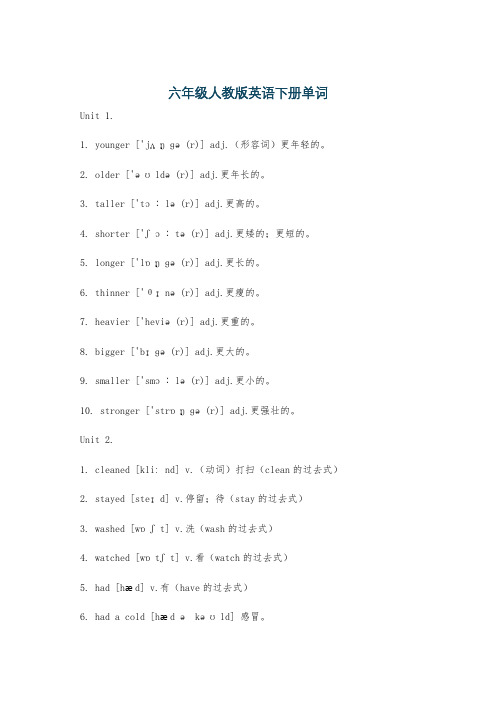
六年级人教版英语下册单词Unit 1.1. younger ['jʌŋɡə(r)] adj.(形容词)更年轻的。
2. older ['əʊldə(r)] adj.更年长的。
3. taller ['tɔːlə(r)] adj.更高的。
4. shorter ['ʃɔːtə(r)] adj.更矮的;更短的。
5. longer ['lɒŋɡə(r)] adj.更长的。
6. thinner ['θɪnə(r)] adj.更瘦的。
7. heavier ['heviə(r)] adj.更重的。
8. bigger ['bɪɡə(r)] adj.更大的。
9. smaller ['smɔːlə(r)] adj.更小的。
10. stronger ['strɒŋɡə(r)] adj.更强壮的。
Unit 2.1. cleaned [kliːnd] v.(动词)打扫(clean的过去式)2. stayed [steɪd] v.停留;待(stay的过去式)3. washed [wɒʃt] v.洗(wash的过去式)4. watched [wɒtʃt] v.看(watch的过去式)5. had [hæd] v.有(have的过去式)6. had a cold [hæd ə kəʊld] 感冒。
7. slept [slept] v.睡觉(sleep的过去式)8. read [red] v.读(read的过去式)9. saw [sɔː] v.看见(see的过去式)10. last [lɑːst] adj.最近的;上一个的;最后的。
11. yesterday ['jestədeɪ] n.(名词)昨天。
Unit 3.1. went [went] v.去(go的过去式)2. camp [kæmp] v.野营;露营;n. 野营;营地。
pep小学英语六年级下册总复习--形容词性代词和名词性代词
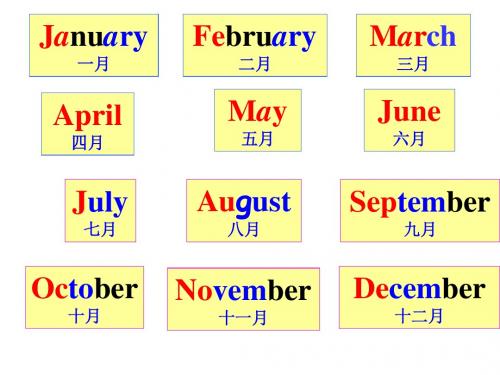
Sarah
hers The book is ____.
她的
她的
后面有名词
名词, 后面无名词
( 后面有名词 )
( 后面无名词 )
练一练。
1. 2. 3. 4. 5. 6. It’s my dog. = It’s ______. mine It’s our dog. = It’s ______. ours It’s your dog. = It’s ______. yours It’s his dog. = It’s ______. his It’s her dog. = It’s ______. hers It’s their dog. = It’s ______. theirs
3月
12日
Tree Planting Day When is________________? March 12th It’s on __________. twelfth
(第十二)
9月
10日 Teacher's Day When is____________________? It’s on ______________. September 10th
22 twenty-two
4月
1日
April Fool’s Day When is________________?
It’s
in + April 1st on + on in __________.
月份
具体日期
6月
1日
Children’s Day When is________________? June 1st It’s on __________.
Whose dog is this?
六年级英语单词讲解
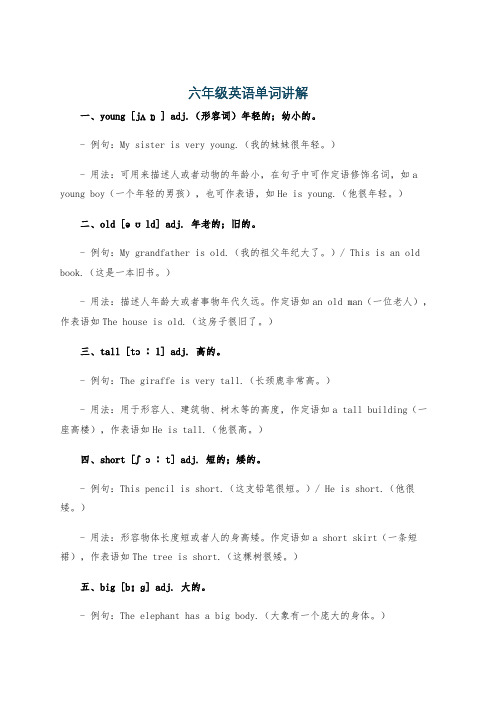
六年级英语单词讲解一、young [jʌŋ] adj.(形容词)年轻的;幼小的。
- 例句:My sister is very young.(我的妹妹很年轻。
)- 用法:可用来描述人或者动物的年龄小,在句子中可作定语修饰名词,如a young boy(一个年轻的男孩),也可作表语,如He is young.(他很年轻。
)二、old [əʊld] adj. 年老的;旧的。
- 例句:My grandfather is old.(我的祖父年纪大了。
)/ This is an old book.(这是一本旧书。
)- 用法:描述人年龄大或者事物年代久远。
作定语如an old man(一位老人),作表语如The house is old.(这房子很旧了。
)三、tall [tɔːl] adj. 高的。
- 例句:The giraffe is very tall.(长颈鹿非常高。
)- 用法:用于形容人、建筑物、树木等的高度,作定语如a tall building(一座高楼),作表语如He is tall.(他很高。
)四、short [ʃɔːt] adj. 短的;矮的。
- 例句:This pencil is short.(这支铅笔很短。
)/ He is short.(他很矮。
)- 用法:形容物体长度短或者人的身高矮。
作定语如a short skirt(一条短裙),作表语如The tree is short.(这棵树很矮。
)五、big [bɪɡ] adj. 大的。
- 例句:The elephant has a big body.(大象有一个庞大的身体。
)- 用法:描述物体的规模、尺寸大,可作定语如a big city(一个大城市),作表语如The box is big.(这个盒子很大。
)六、small [smɔːl] adj. 小的。
- 例句:This cat is small.(这只猫很小。
)- 用法:与big相对,形容物体的规模、尺寸小,作定语如a small room(一个小房间),作表语如The ball is small.(这个球很小。
小学英语六年级形容词分类

小学英语六年级形容词分类形容人的able 有才干的,能干的active 主动的,活跃的adaptable 适应性强的adroit 灵巧的,机敏的aggressive 有进取心的alert 机灵的ambitious 有雄心壮志的amiable 和蔼可亲的amicable 友好的analytical 善于分析的apprehensive 有理解力的aspiring 有志气的,有抱负的audacious 大胆的,有冒险精神的capable 有能力的,有才能的careful 办事仔细的candid 正直的charitable 宽厚的competent 能胜任的confident 有信心的conscientious 认真的,自觉的considerate 体贴的constructive 建设性的contemplative 好沉思的cooperative 有合作精神的creative 富创造力的dashing 有一股子冲劲的,有拼搏精神的dedicated 有奉献精神的devoted 有献身精神的dependable 可靠的diplomatic 老练的,有策略的disciplined 守纪律的discreet (在行动,说话等方面)谨慎的dutiful 尽职的dynamic 精悍的earnest 认真的well-educated 受过良好教育的efficient 有效率的energetic 精力充沛的enthusiastic 充满热情的expressive 善于表达faithful 守信的,忠诚的forceful (性格)坚强的frank 直率的,真诚的friendly 友好的frugal 俭朴的generous 宽宏大量的genteel 有教养的gentle 有礼貌的hard-working 勤劳的hearty 精神饱满的honest 诚实的hospitable 殷勤的humble 恭顺的humorous 幽默的impartial 公正的independent 有主见的industrious 勤奋的ingenious 有独创性的initiative 首创精神have an inquiring mind 爱动脑筋intellective 有智力的intelligent 理解力强的inventive 有发明才能的,有创造力的just 正直的kind-hearted 好心的knowledgeable 有见识的learned 精通某门学问的liberal 心胸宽大的logical 条理分明的loyal 忠心耿耿的methodical 有方法的modest 谦虚的motivated 目的明确的objective 客观的open-minded 虚心的orderly 守纪律的original 有独创性的painstaking 辛勤的,苦干的,刻苦的practical 实际的precise 一丝不苟的persevering 不屈不挠的punctual 严守时刻的purposeful 意志坚强的qualified 合格的rational 有理性的realistic 实事求是的reasonable 讲道理的reliable 可信赖的responsible 负责的self-conscious 自觉的selfless 无私的sensible 明白事理的sincere 真诚的smart 精明的spirited 生气勃勃的sporting 光明正大的steady 塌实的straightforward 老实的strict 严格的systematic 有系统的strong-willed 意志坚强的sweet-tempered 性情温和的temperate 稳健的tireless 孜孜不倦的小学中常用的有:good(好的) ; bad(坏的); small(小的 ; big (大的 ; hugry(饿的;full(饱的); little(少的; high(高的); short(矮的,短的); tall(高的);long(长的); old(老的,旧的); new(新的); young(年轻的); many(许多的); much (许多的); beautiful(漂亮的);nice(美好的); early (早的); late(迟的);right(正确的) ; wrong (错误的); busy(忙的); free(空闲的); lazy (懒的); bored(无聊的); heavy(重的); light (轻的); blind(盲的) ;special(特别的); kind (善良的); happy(高兴的); sad(伤心的); fast (快的); fun(有趣的); scary(吓人的);different (不同的); same(同样的); round (圆的); great (伟大的);颜色:black(黑的) ; white(白的) ; blue(蓝的) ; purple(紫的); pink(粉的) ; yellow (黄的);orange(桔黄的) ; green(绿的) ; brown(棕钯的); grey (灰的);gold(金色的)天气:sunny(晴朗的) ; windy(多风的); cloudy (多云的); rainy(多雨的); snowy(多雪的);。
- 1、下载文档前请自行甄别文档内容的完整性,平台不提供额外的编辑、内容补充、找答案等附加服务。
- 2、"仅部分预览"的文档,不可在线预览部分如存在完整性等问题,可反馈申请退款(可完整预览的文档不适用该条件!)。
- 3、如文档侵犯您的权益,请联系客服反馈,我们会尽快为您处理(人工客服工作时间:9:00-18:30)。
六年级英语语法形容词、副词及比较级最高级一。
形容词的修饰与位置 一般来说,从构词法角度来看,后缀“ly”往往是副词,但有的以“ly'结尾的词是形容词而不是副词,这点要注意;形容词一般可以在句子中做定语,表语等成份,但有些形容词在句子中只能做表语和只能做前置定语;这些形容词在修饰时候有一定的特殊性要引起大家的注意,下面做了一下归纳: 1 以-ly结尾的是形容词而不是副词: costly 昂贵的lonely 孤独的 deadly 死一般的lively 活泼的 friendly 友好的silly 傻气的 kindly 热心肠的likely 可能的 leisurely 悠闲的ugly 长得丑的 brotherly 兄弟般的monthly 每月的 earthly 尘世的 2 只作以“a”开头的很多形容词只能做表语: afraid 害怕的alike 相象的 awake 醒着的alone 单独的,惟一的 alive 活着的ashamed 羞愧的 asleep 睡着的aware 意识到的、察觉到的 well 健康的content 满意的 unable 无能的 3 只作前置定语的形容词 earthen 泥土做的,大地的daily 每日的latter 后面的 golden 金子般的weekly 每周的inner 里面的 silken 丝一般的monthly 每月的outer 外面的 wooden 木制的yearly 每年的elder 年长的 woolen 毛织的former 前任的mere 仅,只不过 only 惟一的sheer 纯粹的very 恰好的 little 小的live 活的 4.下列动词既是实义动词又是系动词,注意用做系动词时,要求形容词做表语: remain keep become,get,grow,go,come,turn,stay,stand,run,prove,seem,appear,look. 如:All those left undone may sound great in theory,but even the truest believer has great difficulty when it comes to specifics. 一般来说,中文意思是“……的”的词是形容词,而中文意思是“……地”的词是副词。
一、形容词概念形容是用来修饰物体的形状,大小,长度,属性,特点等,位于名词的前面。
如:1.He is a hard-working student.(努力的→特点)2.Our English teacher has long hair.(长的→长度)3.The elephants are very big, and the mice are very small.(大的、小的→大小)二、形容词、副词比较级和最高级的意义英语中的形容词和副词,在句子里表示“比较……”、“最……”时,要用特别的形式,即:比较级和最高级。
原来的形式称为原级。
如:long longer longest原级比较级最高级1.The black pen is very long. 黑色的钢笔很长。
2.The blue pen is longer than the black one. 蓝色的钢笔比黑色的长。
3.The red pen is the longest of the three. 红色的钢笔是三支中最长的。
三、形容词、副词比较级的用法表示两者间的比较用比较级。
其常见句式有:1.“A + be +形容词比较级 + than + B”意思为“A比B更……”。
如:This tree is taller than that one. 这棵树比那棵树高。
注意:①在含有连词than的比较级中,前后的比较对象必须是同一范畴,即同类事物之间的比较。
②在比较级前面使用much,表示程度程度“强得多”。
如:A watermelon is much bigger than an apple.③ very, quite一般只能修饰原级,不能修饰比较级。
2.“become+ 形容词比较级 + and+ 形容词比较级”是“变得越来越……”的意思,and连接同一个形容词的比较级。
如:It becomes warmer and warmer when spring comes. 春天来了,天气变得越来越暖和了。
注:表示“越来越……”时,若比较级是“原级 + er”构成的,则常用“比较级 + and + 比较级”形式;若比较级是“more + 原级”构成的,需用“more and more + 原级形式”。
如:Our school is becoming more and more beautiful. 我们的学校变得越来越美丽。
3.在含有or的选择疑问句中,如果有两者供选择,前面的形容词要用比较级形式。
如:Who is taller,Tim or Tom?谁更高,Tim还是Tom?四、形容词、副词的最高级的用法形容词、副词的最高级形式主要用来表示三者或三者以上人或事物的比较,表示“最……”的意思。
句子中有表示范围的词或短语。
如:of the three, in our class等等。
如:He is the tallest in our class. 他在我们班里是最高的。
五、注意形容词最高级前一定要有定冠词the,而副词最高级前则不需要。
六、形容词、副词的比较级和最高级的构成规则1.一般情况下,比较级在后面加-er,最高级在后面加-est;如:small→smaller→smallestshort→shorter→shortest2.在重读闭音节(即:辅音+元音+辅音)中,先双写末尾的辅音字母,比较级加-er,最高级加-est;如:big→bigger→biggesthot→hotter→hottest3.以不发音e结尾的单音节词,比较在原级后加-r,最高级在原级后加-st;如:large→larger→largestnice→nicer→nicest4.以“辅音字母+y”结尾的双音节词,把y改为i,比较级加-er,最高级加-est;如:easy→easier→easiestheavy→heavier→heaviest5.多数多音节词,比较级在前面加more,最高级在前面加most;如:beautiful→more beautiful→most beautifuldifferent→more different→most different6.有少数形容词、副词的比较级和最高级是不规则的,必须熟记。
如:good→better→bestbad→worse→worstold→elder→eldestmany/much→more→mostlittle→less→leastfar →further/farther→ furthest/farthesr相关练习题一、写出下列形容词或副词的比较级和最高级。
te2.short22.nicerge4.young24.heavy5.long25.early6.strong26.easy7.light27.busy8.low28.slowly9.high29.pretty10.slow30.funny11.fast31.dirty12.high32.beautiful13.hard33.interesting14.cheap34.expensive15.bright35.important16.dark36.different17.cool37.excited18.fat38.good/ well19.big39.bad/ill20.thin40.far21.hot 3.old41.many/much二、根据句意填入单词的正确形式。
1.My brother is two years _________ (old) than me.2. Is your sister _________ (young) than you? Yes,she is.3. Who is __________ (thin),you or Helen? Helen is.4. Whose pencil-box is _________ (big),yours or hers? Hers is.5.Ben jumps ________ (high) than some of the boys in his class.6.Does Nancy sing __________ (well) than Helen? Yes, she does.7.My eyes are __________(big) than hers.8.Which is __________ (heavy),the elephant or the pig?9.Who gets up ________ (early),Tim or Tom?10.Do the girls get up_______(early) than the boys? No,they______.11.Jim runs _____ (slow). But Ben runs _____(slow).三、选择正确的词填空。
Sarah is 12 years ________ (old,older).She is one year ________ (older,oldest) than me.But I am 0.1 meter________ (taller, tallest) than her.She studies in Guangzhou interational Shool.She studies ________ (harder,hardest) in her class.Everyone likes her.Yesterday ,she was ill.She took some medicine and she feels ________ (good,better) now.四、选择。
()1. The yellow shoes arethan the blue ones.A.expensiveB. expensiverC. more expensive()2. A cow isbigger than a mouse.A.muchB.moreC.many()3. Who’s the,Jean,Joan or Jennet?A.thinnerB.thinestC.thinnest()4. Tim isthan Jack.A.funnyB.much funnyC.funnier()5. I’m taller than others in my class.I’m.A.tallB.tallestC.the tallest()6. Who can sing betterRose?A.thanB.thenC./()7. I havebooks than you have.A.manyB.muchC.more()8. His uncle’s house is very.A.oldB.olderC.oldest()9. My bike is,but his bike is.A.new,newB.new,newerC.new,newest()10. Please clean your room.It’snow.A.cleanB.dirtyC.tidy五、翻译句子。
